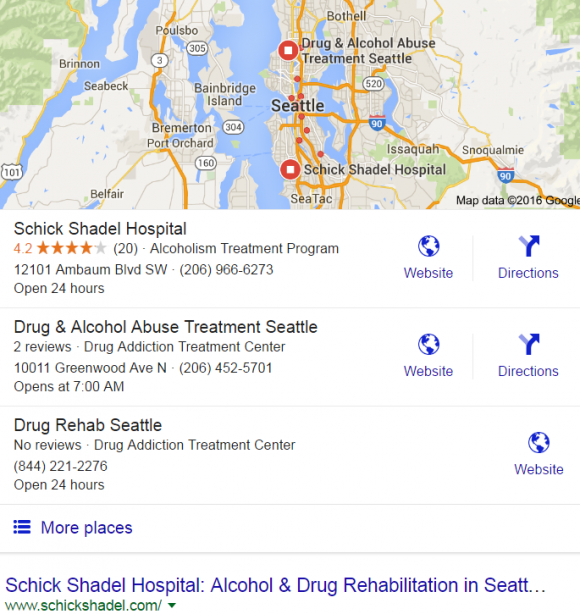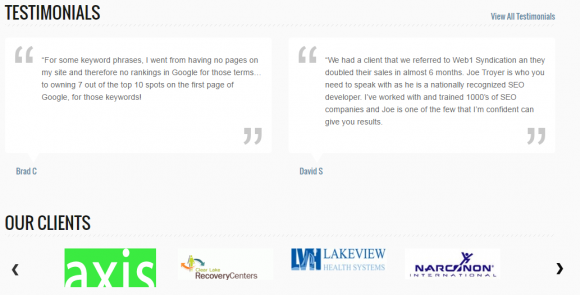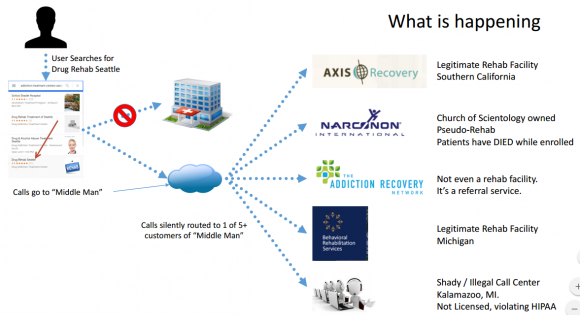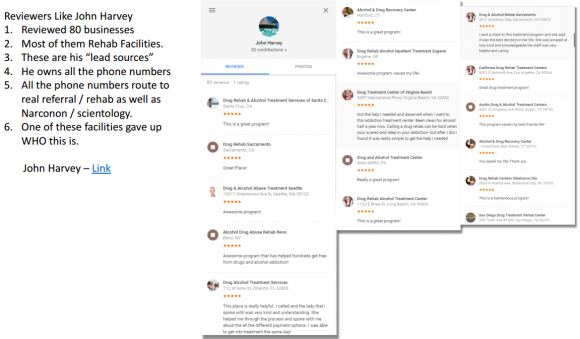Fake online reviews generated by unscrupulous marketers blanket the Internet these days. Although online review pollution isn’t exactly a hot-button consumer issue, there are plenty of cases in which phony reviews may endanger one’s life or well-being. This is the story about how searching for drug abuse treatment services online could cause concerned loved ones to send their addicted, vulnerable friends or family members straight into the arms of the Church of Scientology.
As explained in last year’s piece, Don’t Be Fooled by Fake Online Reviews Part II, there are countless real-world services that are primed for exploitation online by marketers engaged in false and misleading “search engine optimization” (SEO) techniques. These shady actors specialize in creating hundreds or thousands of phantom companies online, each with different generic-sounding business names, addresses and phone numbers. The phantom firms often cluster around fake listings created in Google Maps — complete with numerous five-star reviews, pictures, phone numbers and Web site links.
The problem is that calls to any of these phony companies are routed back to the same crooked SEO entity that created them. That marketer in turn sells the customer lead to one of several companies that have agreed in advance to buy such business leads. As a result, many consumers think they are dealing with one company when they call, yet end up being serviced by a completely unrelated firm that may not have to worry about maintaining a reputation for quality and fair customer service.
Experts say fake online reviews are most prevalent in labor-intensive services that do not require the customer to come into the company’s offices but instead come to the consumer. These services include but are not limited to locksmiths, windshield replacement services, garage door repair and replacement technicians, carpet cleaning and other services that consumers very often call for immediate service.
As it happens, the problem is widespread in the drug rehabilitation industry as well. That became apparent after I spent just a few hours with Bryan Seely, the guy who literally wrote the definitive book on fake Internet reviews.
Perhaps best known for a stunt in which he used fake Google Maps listings to intercept calls destined for the FBI and U.S. Secret Service, Seely knows a thing or two about this industry: Until 2011, he worked for an SEO firm that helped to develop and spread some of the same fake online reviews that he is now helping to clean up.
More recently, Seely has been tracking a network of hundreds of phony listings and reviews that lead inquiring customers to fewer than a half dozen drug rehab centers, including Narconon International — an organization that promotes the theories of Scientology founder L. Ron Hubbard regarding substance abuse treatment and addiction.
As described in Narconon’s Wikipedia entry, Narconon facilities are known not only for attempting to win over new converts, but also for treating all drug addictions with a rather bizarre cocktail consisting mainly of vitamins and long hours in extremely hot saunas. The Wiki entry documents multiple cases of accidental deaths at Narconon facilities, where some addicts reportedly died from overdoses of vitamins or neglect:
“Narconon has faced considerable controversy over the safety and effectiveness of its rehabilitation methods,” the Wiki entry reads. “Narconon teaches that drugs reside in body fat, and remain there indefinitely, and that to recover from drug abuse, addicts can remove the drugs from their fat through saunas and use of vitamins. Medical experts disagree with this basic understanding of physiology, saying that no significant amount of drugs are stored in fat, and that drugs can’t be ‘sweated out’ as Narconon claims.”
FOLLOW THE BOUNCING BALL
Seely said he learned that the drug rehab industry was overrun with SEO firms when he began researching rehab centers in Seattle for a family friend who was struggling with substance abuse and addiction issues. A simple search on Google for “drug rehab Seattle” turned up multiple local search results that looked promising.
One of the top three results was for a business calling itself “Drug Rehab Seattle,” and while it lists a toll-free phone number, it does not list a physical address (NB: this is not always the case with fake listings, which just as often claim the street address of another legitimate business). A click on the organization’s listing claims the Web site rehabs.com – a legitimate drug rehab search service. However, the owners of rehabs.com say this listing is unauthorized and unaffiliated with rehabs.com.
As documented in this Youtube video, Seely called the toll-free number in the Drug Rehab Seattle listing, and was transferred to a hotline that took down his name, number and insurance information and promised an immediate call back. Within minutes, Seely said, he received a call from a woman who said she represented a Seattle treatment center but was vague about the background of the organization itself. A little digging showed that the treatment center was run by Narconon.
“You’re supposed to be getting a local drug rehab in Seattle, but instead you get taken to a call center, which can be owned by any number of rehab facilities around the country that pay legitimate vendors for calls,” Seely said. “If you run a rehab facility, you have to get people in the doors to make money. The guy who created these fake listings figured out you can use Google Maps to generate leads, and it’s free.”

The phony rehab establishment listed here is the third listing, which includes no physical address and routes the caller to a referral network that sells leads to Narconon, among others.
Here’s the crux of the problem: When you’re at Google.com and you search for something that Google believes to be a local search, Google adds local business results on top of the organic search results — complete with listings and reviews associated with Google Maps. Consumers might not even read them, but reviews left for businesses in this listings heavily influence their search rankings. The more reviews a business has, Seely said, the closer it gets to the coveted Number One spot in the search rankings.
That #1 rank attracts the most calls by a huge margin, and it can mean huge profits: Many rehab facilities will pay hundreds of dollars for leads that may ultimately lead to a new patient. After all, some facilities can then turn around and bill insurance providers for tens of thousands of dollars per patient.
WHO IS JOHN HARVEY?
Curious if he could track down the company or individual behind the phony review that prompted a call from Narconon, Seely began taking a closer look at the reviews for the facility he called. One reviewer in particular stood out — one “John Harvey,” a Google user who clearly has a great deal of experience with rehab centers.
A click on John Harvey’s Google Plus profile showed he reviewed no fewer than 82 phantom drug treatment centers around the country, offering very positive 5-star reviews on all of them. A brief search for John Harvey online shows that the person behind the account is indeed a guy named John Harvey from Sacramento who runs an SEO company in Kailua, Hawaii called TopSeek Inc., which bills itself as a collection of “local marketing experts.”
A visit to the company’s Web site shows that Narconon is among four of TopSeek’s listed clients, all of which either operate drug rehab centers or are in the business of marketing drug rehab centers.

TopSeek Inc’s client list includes Narconon, a Scientology front group that seeks to recruit new members via a network of unorthodox drug treatment facilities.
Calls and emails to Mr. Harvey went unreturned, but it’s clear he quickly figured out that the jig was up: Just hours after KrebsOnSecurity reached out to Mr. Harvey for comment, all of his phony addiction treatment center reviews mysteriously disappeared (some of the reviews are preserved in the screenshot below).
“This guy is sitting in Hawaii saying he’s retired and that he’s not taking any more clients,” Seely said. “Well, maybe he’s going to have to come out of retirement to go into prison, because he’s committed fraud in almost every state.”
While writing fake online reviews may not be strictly illegal or an offense that could send one to jail, several states have begun cracking down on “reputation management” and SEO companies that engage in writing or purchasing fake reviews. However, it’s unclear whether the fines being enforced for violations will act as a deterrent, since those fines are likely a fraction of the revenues that shady SEO companies stand gain by engaging in this deceptive practice.
WHAT YOU CAN DO ABOUT FAKE ONLINE REVIEWS
Before doing business with a company you found online, don’t just pick the company that comes up tops in the search results on Google. Unfortunately, that generally guarantees little more than the company is good at marketing.
Take the time to research the companies you wish to hire before booking them for jobs or services, especially when it comes to big, expensive, and potentially risky services like drug rehab or moving companies. By the way, if you’re looking for a legitimate rehab facility, you could do worse than to start at the aforementioned rehabs.com, a legitimate rehab search engine.
It’s a good idea to get in the habit of verifying that the organization’s physical address, phone number and Web address shown in the search result match that of the landing page. If the phone numbers are different, use the contact number listed on the linked site.
Take the time to learn about the organization’s reputation online and in social media; if it has none (other than a Google Maps listing with all glowing, 5-star reviews), it’s probably fake. Search the Web for any public records tied to the business’ listed physical address, including articles of incorporation from the local secretary of state office online. A search of the company’s domain name registration records can give you an idea of how long its Web site has been in business, as well as additional details about the company and/or the organization itself.
Seely said one surefire way to avoid these marketing shell games is to ask a simple question of the person who answers the phone in the online listing.
“Ask anyone on the phone what company they’re with,” Seely said. “Have them tell you, take their information and then call them back. If they aren’t forthcoming about who they are, they’re most likely a scam.”
For the record, I requested comment on this story from Google — and specifically from the people at Google who handle Google Maps — but have yet to hear back from them. I’ll update this story in the event that changes.
Update, 7:47 p.m. ET: Google responded with the following statement: “We’re in a constant arms race with local business spammers who, unfortunately, use all sorts of tricks to try to game our system – and who’ve been a thorn in the Internet’s side for over a decade. Millions of businesses regularly make edits to their addresses, hours of operation and more, so we rely heavily on the community to help keep listings up-to-date and flag issues. But this kind of spam is a clear violation of our policies and we want to eradicate it. As spammers change their techniques, we’re continually working on new, better ways to keep them off Google Search and Maps. There’s work to do, and we want to keep doing better.”






Brian, this is excellent and thank you for sharing. I’m certain you will SAVE many from this groups fraud !
Excellent information as always, Brian. Thank you for keeping us informed!
Monetizing the Internet was a free license to game the system.
Mr. Seely does a great job highlighting this issue, and glad to see it featured here. This is abused all the time, and I wish google would crack down on it. In our little town there are multiple businesses (shame on you Binswanger Glass) that show up in a local search, but if you actually go looking for the store you find it is a national company spamming the results.
Keep up the great work.
Thanks Mike.
Its an epidemic in like 40+ industries.
Care to volunteer my next city to research?
Thank you, Brian, as always. This is invaluable. As a sidenote, Scientology has to be stopped, this is ridiculous.
Thanks Brian
Fantastic article and accompanying video, Brian.
A story I recently ran across detailing some of what goes on at the Scientology rehab centers. More than a bit frightening.
http://www.cracked.com/personal-experiences-2114-inside-scientologys-secret-drug-rehab-center.html
Great article!
For more on the deaths and dozens of lawsuits that the Church of Scientology’s Narconon has generated, and some horrific stories, see Tony Ortega’s Blog.
Here’s a search of his blog with the key word: Narconon –
http://tonyortega.org/?s=narconon&submit.x=0&submit.y=0&submit=Search
Definitely for mature audiences only.
Alanzo
Excellent and interesting story! I will definitely be watching for this and parroting this warning to everyone I know.
Of course we all know that anything on the Internet must be taken with great caution, but we all let our guard down once and a while. The more reminders of due diligence we get, the better!
I understand Amazon is fighting a war with fake reviewers as well!
This is fabulous. More press attention is NEEDED on this problem and as usual Bryan Seely’s work is fabulous.
Thanks Joy.
Great article Brian and highly readable from a layman perspective.
Terrific stuff.
If you’re looking for an addiction rehab service, here’s a suggestion:
Ask somebody you trust in your community. This could be a doctor’s office, a pharmacist, a minister, a city health department or elder-services department, a school nurse, or somebody at a local twelve-step program.
All those folks get questions like this. All of them know how to make referrals. All have some sort of ethical obligation (be it HIPAA or twelve-step principles or ministerial confidentiality) to keep your business to themselves.
Google or Bing have no such obligations.
Just thought I’d throw this in. We don’t have use the intertoobz for EVERYTHING, you know.
Good luck with getting a comment from Google. It’s very difficult to reach a human there.
Wow. The level of Bryan’s research is awesome! The Scientology involvement is journalists dream come true.
My question is what will it take for Google to take a more proactive role in spam abuse of this nature. It’s one thing to hoodwink a locksmith job. It is an entirely different situation when dealing with some dealing with a serious drug problem. It’s not like they build up the courage to make that call on a regular basis.
These SEO firms praying on drug and alcohol addiction deserve to rot in hell.
Thank you Cody.
This sort of worked out really well for consumers, considering there aren’t many people who understand spammers at this level.
Google doesn’t care. Period. Its not in their interest to fix the problem, its in their interest to minimize the problem.
I think I am going to make a hobby of uncovering this stuff.
HackerVsScammer.com has a nice ring to it.
Brian, The TopSeek website that you link in this article loads a Viagra page for me when clicked on from this article.
Video of what happens when I click the link = http://www.fastswf.com/l8W1w0k
Lander src code = http://pastebin.com/vr4tc5Tn
Looks like his hosting is hacked and hosting malicious pharma landers depending upon your referrer ?
yes i also clicked on that link and get that online pharmacy site…..
Brian if they were hacked or something maybe you should remove link before they star redirecting to some EK landing page .
Regards
Folks — that pharmacy page only pops up if you visit the linked page (http://topseekinc.net/#) from my site. That is to say, if topseek sees you are coming from my story URL (i.e., clicking the link in this story to their site), they serve the pharmacy ad. If you just load the page directly, you get the regular site. It’s a lazy F___ you to this site, but there it is. About what I would expect from a spammer.
As a digital marketing professional I see first hand how ridictlous spam locations take over the entire 3 pack of results. It’s unfortunate because it almost fuels the need for others to do the same to compete. There should be strict laws on false reviews or manipulation for anything that can effect the safety of someone.
FAKE ONLINE REVIEW!
Yes. That’s what the article above is.
45 years ago the hippie revolution left me dying and on drugs. Standard application of Scientology technology enabled me to get off and stay off. The only drugs I’ve had since 1970 have been antibiotics prescribed by a doctor.
Your personal anecdote does not validate advertising fraud.
It’s online
It’s a review
How is it any less real than your review?
Yours sounds like the fake review to me.
John (or John in Okinawa when you troll any adverse comment on $cientology),
Gaming the reviews and preying on people looking for real rehab is vile.
Narconon is deadly and based on the quack treatment invented by a dropout
With zero credentials.
Go back to your cheese-making instead of defending the indefensible.
Narconon is slowly but surely being driven out of business by dozens and dozens of law-suits.
Your cheese seems to be excellent.
Your anecdotal tale is irrelevant and just more cheesy nonsense from someone unable to recognize that $cientology does not work.
Not for junkies, not for alcoholics, not for Kool-Aid drinkers.
There are no clears, no OT powers, nada.
That is why fraud and dishonesty is the only option.
Nice to see that Scientologists haven’t lost their touch and still pay attention to the news.
The Hippy revolution left me enlightened & self aware. Does anyone remember the oversize shirt button Speed Kills? Seen often in Haight Ashbury in the day. We understood Psychedelics as a pathway, thanks to CIA overt/covert attempts to develop them, primarily LSD, as “Mind Control Drugs”. That’s right the Counterculture was inadvertently enabled by CIA, Kesey & others got it out of that little white building & the rest became history. Truth as always stranger then fiction. Sorry for your risky misadventure brought on perhaps by the common denominators of rebellion & perhaps addictive personality.
Don’t waste your time on this junk site. A rational discussion is not possible with a blind man. Especially those with a hidden agenda.
^^^^^Great example of a fake review^^^^^
_________________
It often looks like spam
_________________
LMFAO!!!
Archie – What about being blind precludes one from having a rational conversation?
Nice to see Google’s response.
Pity the Xenu freaks are going to overwhelm the comments section soon. Brian might want to consider turning comments off for a bit…
Sounds like the church of Science Fiction, is building up a lot of bad Karma preying on the weak and vulnerable.
As usual, that is
I really like the part about how Google relies “heavily on the community to help keep listings up-to-date and flag issues” when the tools they provide are limited, difficult to use, and have little transparency.
I ran across a similar situation a few years ago when my home air conditioner failed. Internet searches kept pointing me to “local” companies that I have never heard of. I became suspicious when after calling several businesses, I realized that in some cases I was talking to the same person
No insurance company should cover this life-threatening fraud, implemented by entirely untrained caregivers. Like Pharma spam this needs to be attacked at point of payment.
http://www.tampabay.com/news/scientology/deaths-at-scientology-drug-treatment-program-narconon-bring-investigation/1246054
Searching for an extended care facility aka nursing home also results in websites with multiple places listed but the toll free numbers connect to a call center often out of state. As another commenter noted, ask friends or family or visit in person.
Very good article to make us thinking about importance we put on relevant considered comments.
Not very please to have someone who shares my real name (John Harvey) committing this kind of fraud, but then again, Scientology has been known for these tactics. I fully expect that their team of lawyers and damage control experts will be contacting Brian to try to make his life miserable, or perhaps take him on the mighty Freewinds cruise ship and hook him up to their “e-meter”. 🙂
Keep on fighting Brian!
Thanks for the great read, as usual. Yet another example of how technology has complicated our lives- it still comes down to dealing with a real human being on the other end of the line.
Sleazy underbelly of existence, defrauding and misleading people for a living. Only the criminal mind…….. Some people just aren’t having a good day unless they are wallowing in deception or bullying others. What kind of person wants to get paid to lie all day long to others?
Looks like the scientologists are starting to show up. East to spot. Their arguments are all attacks against the person rather than the accusation, and no defense of their position or even the points they try to make.
I guess fair game still lives on as one of their policies